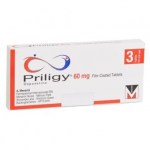- Type of drug: Selective serotonin reuptake inhibitor (SSRI)
- Prescribed for: Premature ejaculation (PE) in men
Priligy General Information
Generic Priligy Dapoxetine is the leading drug for men who suffer from premature ejaculation. Dapoxetine is an inexpensive alternative to the branded product.
Dapoxetine is used to treat premature ejaculation in men between the ages of 18 and 64 years. Premature ejaculation (premature ejaculation, ejaculation praecox, premature ejaculation (PE) is a serious problem for many men around the world. Both men and their partners suffer as a result, and the problems that cause this disorder are worsening the sexual life. They can affect the quality of life and burden the partnership.
Priligy is indicated for the treatment of premature ejaculation in adult men aged 18 to 64 years. Priligy should only be prescribed for patients who meet all the following criteria:
- An intravaginal ejaculation latency (IELT) of less than two minutes;
- Persistent or relapsing ejaculation with minimal sexual stimulation before, on, or shortly after penetration and in front of the patient;
- Marked personal distress or interpersonal difficulties as a result of PE;
- Poor control of ejaculation;
- A history of premature ejaculation in the majority of intercourse attempts over the last 6 months.
Priligy Cautions And Warnings
Do not take Priligy in case of significant pathological heart diseases such as:
- Heart failure (NYHA class II-IV)
- Conduction abnormalities such as AV block or sick sinus syndrome
- Significant ischemic heart disease
- Significant valve disease
- A history of syncope
- A history of mania or severe depression.
Possible Side Effects
Common side effects: Insomnia, anxiety, agitation, restlessness, libido reduction, abnormal dreams, drowsiness, attention deficit disorder, tremor, nervous discomfort, blurred vision, tinnitus, blushing, sinus obstruction, yawning, diarrhea, dry mouth, vomiting, constipation, abdominal pain, abdominal pain, indigestion, bloating, upset stomach, sweating, erectile dysfunction, fatigue, irritability, blood pressure increase.
Priligy Drug Interactions
Priligy is not supposed to be taken alongside with drugs from the following list:
- drugs for depression, called mono-amino-oxidase inhibitors (IMAO)
- thioridazine used for schizophrenia
- other drugs for depression
- lithium, a drug for bipolar disorder
- linezolid, an antibiotic used to treat infections
- tryptophan, a sleeping pill
- the herb of San Giovanni, an herbal medicine
- tramadol, used for the treatment of severe pain
- medicines used to treat migraine.
Priligy Food Interactions
Priligy can be taken with or without food. If you suffer from persistent side effects, taking Priligy after a meal can help you avoid adverse events. It is inadvisable to take Priligy with meals high on protein content.
Priligy Usual Dose
Priligy should only be given as an on-demand treatment before the expected sexual activity. Priligy should not be prescribed to delay ejaculation in men who have not been diagnosed with PE.
Priligy is available in two doses, 30mg and 60mg, for your prescriber to choose from based on patient’s response towards the therapy, tolerance and side effects, if any. Priligy is taken between 1 and 3 hours before the planned intimacy, once a day, and should not be taken on everyday basis.
Priligy Overdosage
An overview of related studies suggests that Priligy overdose symptoms have a low risk of serious side effects and no mortality instances. Dapoxetine used in Priligy belongs to the class of SSRI antidepressants, which is the next generation after TCA (tricyclic antidepressants) – overdose with those letter being associated with high level of mortality.
Be advised that the onset of serious adverse events occurs after 75 times the recommended dose of Priligy. Those include decreased consciousness, changes in ECG and other cardiac symptoms, seizures, etc. If you experience severe side effects after what you suspect is an overdose with dapoxetine, seek help from your doctor or your local poisoning control center.
Priligy Special Information
Priligy should not be used by individuals with the history of substance abuse.
Priligy Use In Special Populations
Priligy in patients with substance abuse history: the use of the drug is contraindicated in this category. Priligy in pregnancy and breastfeeding: Priligy is not designed to be used in women. The potential harm for the fetus and/or the baby is not estimated; the of Priligy is highly not recommended.

